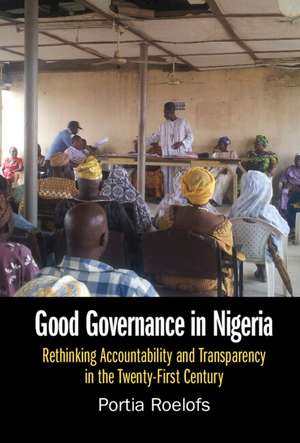Good Governance in Nigeria: Rethinking Accountability and Transparency in the Twenty-First Century
Autor Portia Roelofsen Limba Engleză Hardback – 19 apr 2023
Preț: 587.15 lei
Preț vechi: 659.72 lei
-11% Nou
Puncte Express: 881
Preț estimativ în valută:
112.35€ • 122.42$ • 94.67£
112.35€ • 122.42$ • 94.67£
Carte tipărită la comandă
Livrare economică 23 aprilie-07 mai
Preluare comenzi: 021 569.72.76
Specificații
ISBN-13: 9781009235426
ISBN-10: 1009235427
Pagini: 264
Dimensiuni: 237 x 158 x 27 mm
Greutate: 0.64 kg
Editura: Cambridge University Press
Colecția Cambridge University Press
Locul publicării:Cambridge, United Kingdom
ISBN-10: 1009235427
Pagini: 264
Dimensiuni: 237 x 158 x 27 mm
Greutate: 0.64 kg
Editura: Cambridge University Press
Colecția Cambridge University Press
Locul publicării:Cambridge, United Kingdom
Cuprins
Introduction: competing conceptions of good governance; 1. Contested legacies of good governance; 2. Good governance, what's not to love? The Lagos model in Lagos, Oyo and Ekiti states; 3. Be accessible! Accountability, performance and the politician who is 'always in a meeting'; 4. Theorising accountability as accessibility: communication, social sanctions and the limits of principal-agent models; 5. Transparency in people: information, cabals and the politics of hidden networks; 6. Socially embedded good governance: the public-private divide, out-of-office politicians and 'personal' politics in Africa; Conclusion: what Nigeria can teach us about good governance: from socially embedded governance to twenty-first-century democracy.
Recenzii
'This seminal work takes a new look at the long-contested terrain of 'good governance' and suggests a renewed focus on the subject as a socially embedded activity. Rich in methods, theory, and data, it examines the Nigerian case to show how an experience long on bad news could produce promising opportunities and resources for good governance and democracy in Nigeria - and beyond.' Adigun Agbaje, University of Ibadan
'Portia Roelofs has written a bold contribution to ongoing debates on governance quality and democracy. Challenging ontological and epistemological assumptions in the mainstream literature, Roelofs' approach to socially-embedded good governance is an excellent, empirically grounded and locally sensitive understanding of home-grown governance principles in Nigeria.' Wil Hout, International Institute of Social Studies, Erasmus University Rotterdam
'Roelofs is to be commended for taking the terms of Nigerian political life seriously, reading them not as evidence for a theory generated elsewhere, but as serious theoretical and ethical contributions to global and local discussions about accountability and transparency in politics. Paired with her refreshingly clear and direct writing, this book is as readable as it is compelling.' Leigh K. Jenco, London School of Economics and Political Science
'Portia Roelofs has written a bold contribution to ongoing debates on governance quality and democracy. Challenging ontological and epistemological assumptions in the mainstream literature, Roelofs' approach to socially-embedded good governance is an excellent, empirically grounded and locally sensitive understanding of home-grown governance principles in Nigeria.' Wil Hout, International Institute of Social Studies, Erasmus University Rotterdam
'Roelofs is to be commended for taking the terms of Nigerian political life seriously, reading them not as evidence for a theory generated elsewhere, but as serious theoretical and ethical contributions to global and local discussions about accountability and transparency in politics. Paired with her refreshingly clear and direct writing, this book is as readable as it is compelling.' Leigh K. Jenco, London School of Economics and Political Science
Notă biografică
Descriere
Drawing on original fieldwork in Nigeria, Portia Roelofs reconsiders what good governance means, focusing on accountability and transparency.
